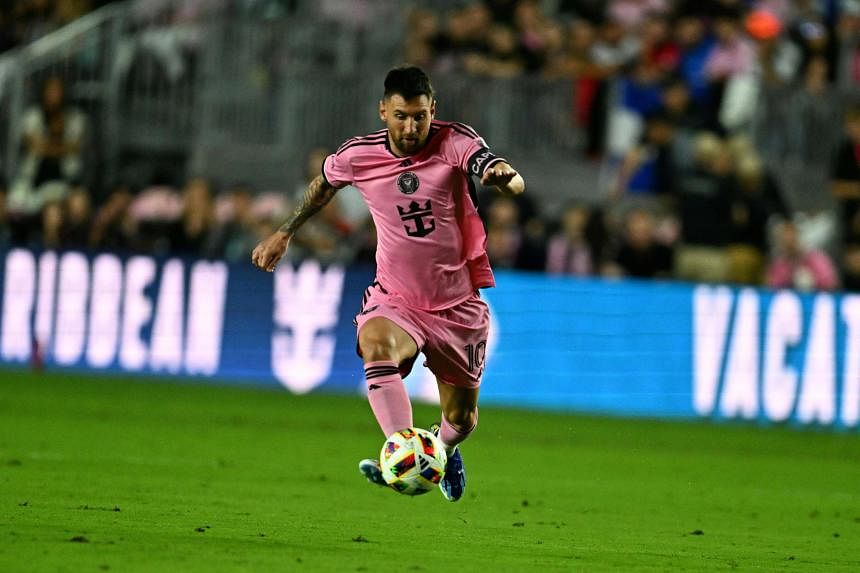NEW YORK – The video, posted on the website of the South China Morning Post, was simple and inflammatory in its headline: “Why Hong Kong Hates Messi.”
There followed a monologue by the publication’s managing editor in which he chastised Lionel Messi, the Argentinian World Cup winner and the prized asset of Major League Soccer team Inter Miami.
“All petulant in pink like some thuggish flamingo,” Yonden Lhatoo said of Messi.
For Messi, this is one of the more flattering descriptions during a bewildering period in which he has found himself at the centre of geopolitical, cultural and sporting tensions cutting across Hong Kong, China, the United States, Japan and Argentina.
Messi’s Inter Miami, co-owned by David Beckham and construction billionaire Jorge Mas, embarked upon a lucrative pre-season tour across Saudi Arabia, Hong Kong and Japan.
This was Messi’s first tour since Inter Miami secured his services, in a deal that also lured in revenue-sharing agreements with major brands Apple and Adidas.
Messi’s appeal is huge, underlined by almost 500 million Instagram followers and more than eight million followers on the Chinese social media platform Weibo.
His presence on this tour ought to have turbocharged Inter Miami’s global status, hitting key markets in the Middle East and Asia.
The problem came when Messi experienced discomfort in his adductor muscle, and an MRI scan showed an edema, swelling caused by too much fluid trapped in the body’s tissues.
Messi played only seven minutes as a substitute in an exhibition match against Cristiano Ronaldo’s Al-Nassr in Riyadh.
There was disappointment, but Messi’s appearance as a substitute soothed the dismay of officials in Saudi Arabia, where Messi is an ambassador of the tourism board.
In Hong Kong, however, where Messi did not play at all, the recriminations rumble on.
Inter Miami’s match against a Hong Kong team had been vigorously promoted, and it attracted a near-capacity crowd of 38,323.
The promoter, Tatler Asia, touted the game as “more than a football match”, saying that the two-day festival would bring together sports and entertainment to be “the most highly anticipated event of the year and elevate Hong Kong’s status as Asia’s World City”.
Yet Messi did not play, and his heralded teammate Luis Suárez did not play either, despite appearing at the pre-match news conference one day earlier.
Messi’s image was at the heart of a billboard and social media campaign to promote the match.
Supporters felt ripped off, as disgruntled fans booed and shouted “wui seoi”, the Cantonese term for refund.
Then came the chants of “We want Messi.” After the match, Beckham, once a darling of Hong Kong football fans, tried to address supporters with a post-match speech, only to be booed.
The Tatler Asia chair and CEO, Michel Lamuniere, told The Athletic that Messi had been listed as available to play as a substitute for the game. But then, “15 minutes before the start” of the game, he learnt that Messi may not play at all. He added: “The rest of the first half was spent trying to find solutions for Messi to play, talking, and moving around the pitch.”
Tatler announced that it would refund 50 per cent of the ticket price for supporters, which will lead to over US$5 million (S$6.7 million) in losses from the event.
Tensions were further strained when Messi appeared for Inter Miami in a friendly in Japan on Feb 7, just 72 hours after declaring himself unfit to play in Hong Kong.
Chinese state-affiliated newspaper Global Times published an editorial claiming that “external forces” who want to undermine Hong Kong may have been behind Messi’s no-show.
They argued the fact that Messi appeared in every other pre-season game besides Hong Kong “magnified suspicions” about Messi’s and Inter Miami’s integrity.
Regina Ip, the convener of the Hong Kong Executive Council, wrote on X, formerly Twitter: “Hong Kong people hate Messi, Inter Miami and the black hand behind them,” a reference to foreign entities that are hostile to China and Hong Kong, “for the deliberate and calculated snub to Hong Kong.”
She added: “Messi should never be allowed to return to Hong Kong. His lies and hypocrisy are disgusting.”
Messi made attempts to calm the storm. He published a message, published in Chinese and Spanish, on his Weibo account before the game took place in Tokyo.
“It was a real shame not to be able to play in Hong Kong the other day due to a groin injury... and I was in pain,” he wrote.
Inter Miami, for their part, said in a statement to Reuters last week that they were sorry.
End of story? Not quite.
On Feb 9, the sports authorities in Beijing and Hangzhou revealed that they would no longer host two friendly matches that Argentina had been slated to play in March against Ivory Coast and Nigeria.
The Hangzhou Sports Bureau said it would not host the match “in view of the reason everyone knows”. NYTIMES

